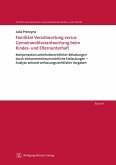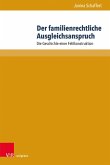Child maintenance regulation is a prominent subject of legal debate and social policy. The different contributions to providing for children in cash and care - money, the means of subsistence in kind, education, time and so forth - are unevenly distributed between separated mothers and fathers. The research question is how family law recognises the different contributions and how the provision of unpaid care and time is acknowledged as a contribution on its own. This question and its gender dimension have been neglected in the debate on family law and child support. The authors discuss the German family law model of an asymmetrical distribution of cash and care for children of separated parents, its gendered role model assumptions, and contested legal question of who has to pay which share of the child costs (contributions for kindergarten, alternating residence of the child, reduction of employment of the child support debtor etc.). From a legal policy perspective the problem is discussed how to formulate child support rules in a way which does not discriminate against the primary care giver.
Dieser Download kann aus rechtlichen Gründen nur mit Rechnungsadresse in A, B, BG, CY, CZ, D, DK, EW, E, FIN, F, GR, H, IRL, I, LT, L, LR, M, NL, PL, P, R, S, SLO, SK ausgeliefert werden.









